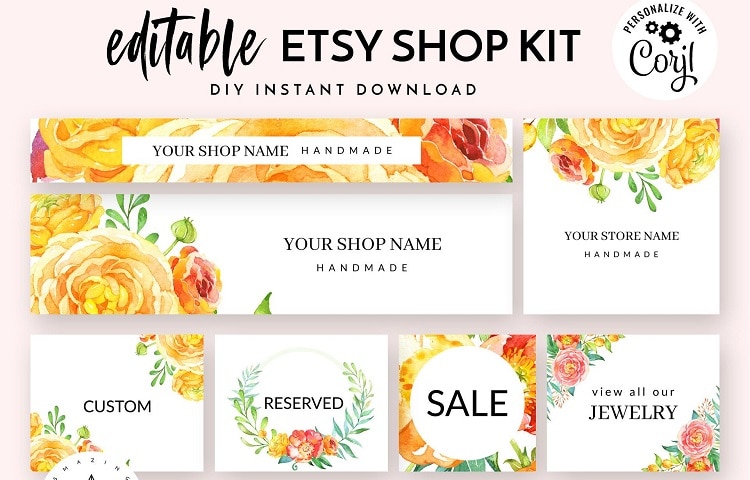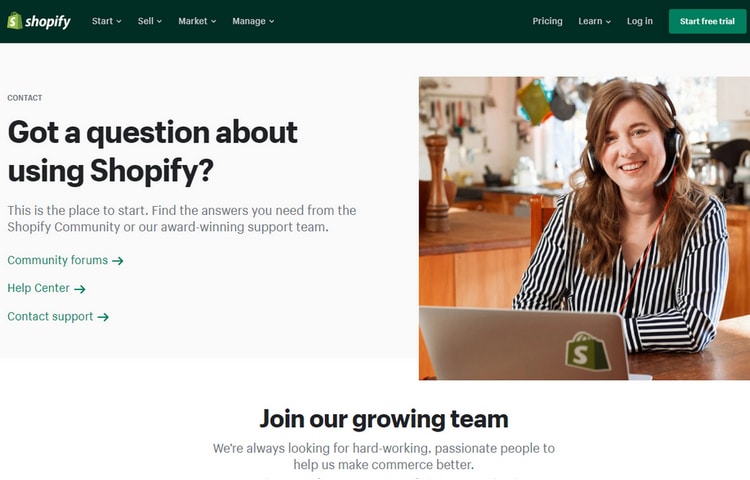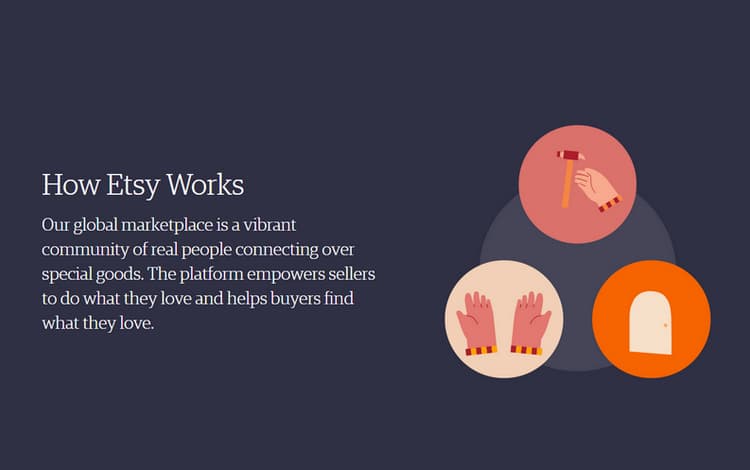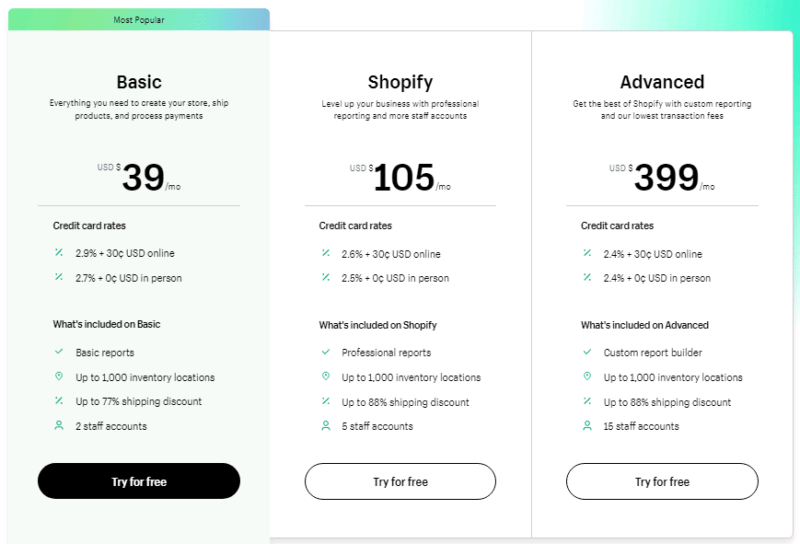My content is reader-supported by awesome people like you. Which means I could earn a commission. Learn more here!
In the digital age of consumerism, choosing the right selling platform is everything.
The online store you choose as your shopfront will be your main point of contact with customers, it’s where people can browse what your brand is all about, and it’s how you’ll make your bread and butter.
With so many choices out there and ways to sell, it can get overwhelming trying to find the right approach.
Two of the biggest names for selling platforms are Esty and Shopify, and although they’re both booming right now, what they offer and how they work for different types of goods are completely unique.
So, what is better, Shopify or Etsy?
The debate over Shopify vs Etsy has been long-running, but each offers something that the other can’t.
Etsy is a marketplace that’s more targeted at homemade and handmade goods, antiques, and unique items, whereas Shopify is a platform that a business can use for creating an online store.
If you have products to sell or are thinking of launching an e-commerce site, having the right platform to do it will be crucial to your success.
We’re here to compare how Etsy and Spotify sell, what type of products they’re best for, and whether they’re a good fit for your online store’s goals.
What is Shopify?
Shopify is known as a website platform and it gives anyone the chance to create an online store to sell their products, goods, and services.
The platform was started years ago when a serious hole in the market was found, and it was hard to get a simple way to start an eCommerce store without doing all the leg work yourself.
With a Shopify account, everything is taken care of for you and you’ll get all of the tools you need to market, sell, engage, communicate, ship, and get paid for your items.
You can sell just about anything there, including services, memberships, subscriptions, digital items, and physical goods, so there are no limitations.
What is Etsy?
Esty is another popular selling platform but with a unique twist.
This is an online marketplace solely for independent craft makers, fashion designers, furniture makers, and artists to sell their goods, and for collectors of vintage and antique items to sell what they have found with the rest of the world.
Those wanting to sell on Etsy will need to open up a store on the site, so it’s unlike others where you can just list one item anonymously.
These sellers then list their goods and manage their inventory and orders, taking care of shipping and accepting payments.
In this way, Etsy is the middleman between the customer and store owner and gives them an easy way to sell their goods.
How Shopify and Etsy Compare
To get a true sense of the differences between Etsy and Shopify, we’ve done a detailed comparison of where it matters most.
We’ll weigh them up in cost, design, ease of use, payment options, and customer support to see which is the clear winner and which one will suit your business best.
Pricing and Fees
The first thing people ask when looking for a platform to host their store is, ‘how much is this going to cost?’
Money is an important factor in business, no matter what you’re selling, so here’s how the two stack up against each other.
- Shopify: There are three plans available here: Shopify, Shopify Plus, and Shopify Premium, all of which offer unlimited product listings, customer support, and an online store and website. The premium model costs $399 a month but offers the full suite of services with extras like more languages and a lower credit card fee for customers.
- Etsy: Etsy charges store owners $0.20 for every item they list, and 5% of the final sale price plus shipping and gift wrapping. Additional costs for ad listings and marketing apply but only if you choose to use them.
Designs, Templates, and Store Layouts

The look and feel of your online store will be important to customers and could mean the difference between a sale and a swift exit.
Here is how Shopify and Etsy handle their layouts and design.
- Shopify: Shopify has over 30 themes to choose from and each one can be customized further. This makes it easy to get your brand out there and make your e-commerce store stand out from the rest.
- Etsy: All Etsy stores run on the same template so they look quite similar. The only thing you can adjust is your logo, listing images, and descriptions, so it’s easy to get lost in the mix with all of the other sellers, and hard to brand yourself.
Ease of Use
How easy an online store is to build will be a make or break for some users, as they might have limited knowledge of the web and how to create an e-commerce site.
If this matters to you, you’ll want to know all about what these options do.
- Shopify: Shopify makes it simple for anyone to create a website and they walk you through every step of the way. You can do everything like manage orders, track inventory, and make new listings with the help of their easy guides, even if you’ve never done this type of thing before.
- Etsy: Etsy is just as simple as Shopify, and even more so, as there’s no need to create a brand new website just to list your products. Setting up a store can be done in a matter of minutes.
Domain and URL Structure
A domain name needs to be short, snappy, and easy to read, and if this is the gateway to your business, your store needs to follow those rules.
You might have something in mind for a website name or aren’t fussed on what it’s called, so see what they offer.
- Shopify: Shopify encourages all store owners to bring their own domain or come up with a custom one. They have a tool available to help you create a URL if you don’t already have one in mind.
- Etsy: You must use an Etsy URL for your store, which can be confusing and hard to type. If you’re only selling products there, it’s not a bother, but for those with plans of doing business elsewhere, you’ll want a standalone web page.
eCommerce Tools and Resources
Some people need a little help creating an online presence, and others don’t need much at all.
Wherever you stand, having some tools and resources that make selling easier is always a good thing, so check out how they compare.
- Shopify: Shopify offers a full suite of tools to make your business boom and their goal is to get your store more business than ever. Shopify includes marketing, SEO, shipping, fulfillment, security, and payment options, so you don’t have to use anything other than this site.
- Etsy: For a smaller marketplace, Etsy also has a lot to offer. You can print discounted shipping labels, use their marketing and advertising tools, and integrate your store with social media platforms as well.
Customer Support

Customer service is key, no matter what type of business you’re dealing with, but when it’s an online store that you have, you want to feel supported.
Both online platforms come with customer service for you as the store owner, but they offer it in different ways.
- Shopify: Shopify has a comprehensive customer support team available 24/7. They can be reached via online chat, phone, email, social media, and video tutorials. No matter the time of day or what’s gone wrong, you’ll be able to reach them.
- Etsy: Etsy has an online discussion for support, an email address, and scheduled phone calls. It’s not as impressive as Shopify’s 24/7 service but for these smaller types of stores, it should be enough.
Payment Options and Checkout
The payment is the final step in the process for your customers and you want to make it easy for them.
Shopify and Etsy offer a range of ways for people to shop at their favorite stores, so check out what’s on offer.
- Shopify: Shopify creates their stores with you in mind, and they charge no transaction fees when you use their specialty Shopify Payments scheme, which has a higher upfront fee. Otherwise, standard fees apply, however, they’re lower than with Etsy at around 2%. There are loads of gateway payments accepted as well.
- Etsy: Etsy charges a 3% payment processing fee which can add up over time. However, they do accept a range of payment options including PayPal and more, depending on what the individual store is happy to do.
Key Pros and Cons to Consider

Before we reach our final decision, we’ve tallied up the best and worst that each of these platforms has to offer so you can see which one would suit your business plans.
Shopify
- Pros: comprehensive setup from marketing to store to shipping, customizable design to help you stand out, cheaper fees.
- Cons: Takes longer to set up, not ideal for smaller-scale businesses with only a few things to sell
Etsy
- Pros: has a market grasp on handmade goods, easy to set up and list items
- Cons: non-customizable design, higher processing fees, hard to stand out among other stores
Shopify vs Etsy: Which is Best?
All in all, it’s hard to declare a winner that would suit all types of e-commerce businesses, as both offer different things.
Shopify seems to be the top contender when it comes to a comprehensive online store, offering all aspects of e-commerce and doing it at a reasonable price.
However, Etsy has a handle on the homemade and antique goods market, which continues to boom.
These one-of-a-kind items would never do well on a Shopify store, so if this is what you sell, it’s best to stick with the one that does it best.
Both offer great things that would suit different types of businesses but Shopify would be our favorite pick if we had more to sell and wanted greater customization in a website.
Whichever option you go with, you’ll have a trusted platform to sell your goods and services, as both have made a name for themselves in the e-commerce world.
Related Questions
Choosing an online platform for your business is hard work and there’s a lot of second-guessing that goes on as you weigh up all of the options.
To give you some more insight into e-commerce solutions, we’ve answered some FAQs that might point you in the right direction.
What Should a Good E-Commerce Site Include?
To create a good e-commerce site that provides a simple and satisfying experience for the customer, you should have an easy-to-use checkout, thorough search function, and discount or coupon codes available to entice the buyer.
A commerce site should be safe, secure, simple, and fast so people are more likely to buy from your store in the future.
Is Wix Better Than Shopify?
Wix is another popular selling platform for online stores and is considered a general-purpose website builder rather than one dedicated solely to eCommerce.
Compared to Shopify, this might be a better fit if you want to publish elements like forms, events, and galleries, rather than just selling goods.
What Are the Best eCommerce Platforms?
If you’d prefer to use one of the most popular e-commerce platforms already out there, you have a few good options to choose from.
Wix, Squarespace, Shopify, Volusion, and Zyro are some of the top contenders in e-commerce platforms and with defining features that help them stand out from the competition.






Leave a Reply